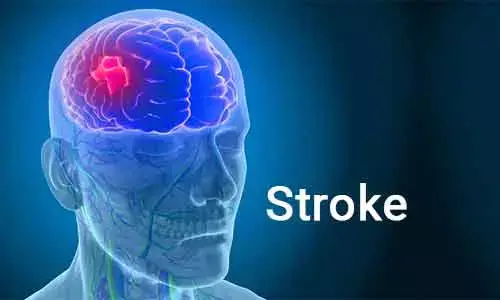- Home
- Medical news & Guidelines
- Anesthesiology
- Cardiology and CTVS
- Critical Care
- Dentistry
- Dermatology
- Diabetes and Endocrinology
- ENT
- Gastroenterology
- Medicine
- Nephrology
- Neurology
- Obstretics-Gynaecology
- Oncology
- Ophthalmology
- Orthopaedics
- Pediatrics-Neonatology
- Psychiatry
- Pulmonology
- Radiology
- Surgery
- Urology
- Laboratory Medicine
- Diet
- Nursing
- Paramedical
- Physiotherapy
- Health news
- Fact Check
- Bone Health Fact Check
- Brain Health Fact Check
- Cancer Related Fact Check
- Child Care Fact Check
- Dental and oral health fact check
- Diabetes and metabolic health fact check
- Diet and Nutrition Fact Check
- Eye and ENT Care Fact Check
- Fitness fact check
- Gut health fact check
- Heart health fact check
- Kidney health fact check
- Medical education fact check
- Men's health fact check
- Respiratory fact check
- Skin and hair care fact check
- Vaccine and Immunization fact check
- Women's health fact check
- AYUSH
- State News
- Andaman and Nicobar Islands
- Andhra Pradesh
- Arunachal Pradesh
- Assam
- Bihar
- Chandigarh
- Chattisgarh
- Dadra and Nagar Haveli
- Daman and Diu
- Delhi
- Goa
- Gujarat
- Haryana
- Himachal Pradesh
- Jammu & Kashmir
- Jharkhand
- Karnataka
- Kerala
- Ladakh
- Lakshadweep
- Madhya Pradesh
- Maharashtra
- Manipur
- Meghalaya
- Mizoram
- Nagaland
- Odisha
- Puducherry
- Punjab
- Rajasthan
- Sikkim
- Tamil Nadu
- Telangana
- Tripura
- Uttar Pradesh
- Uttrakhand
- West Bengal
- Medical Education
- Industry
Strokes after TIAs have declined over time, shows JAMA study

SAN ANTONIO and BOSTON - Study findings released Tuesday in the Journal of the American Medical Association (JAMA) hold both good news and bad news about transient ischemic attacksp (TIAs), which are harbingers of subsequent strokes.
Sudha Seshadri, MD, professor of neurology at The University of Texas Health Science Center at San Antonio and director of the university's Glenn Biggs Institute for Alzheimer's and Neurodegenerative Diseases, is senior author of the study and senior investigator of the Framingham Heart Study, from which the findings are derived. She said the extensive follow-up of Framingham participants over more than six decades enabled the study to present a more-complete picture of the risk of stroke to patients after a TIA.
The study points to the need for intensive, long-term follow-up of patients who have had a TIA, said lead author Vasileios-Arsenios Lioutas, MD, a neurologist at Beth Israel Deaconess Medical Center and Harvard Medical School.
"According to our findings, people continue to have a high risk of stroke for a sustained time after they've had a TIA," Dr. Lioutas said. "Therefore, one shouldn't think that the high-risk period is just in the first 90 days after the attack and then one can relax. It seems these patients should be followed closely over time, keeping in mind that they are at risk for stroke and paying close attention to controlling their cardiovascular risk factors."
Among 14,059 Framingham participants, 435 had a TIA. Researchers compared the TIA-positive group against a second group of 2,175 participants who did not have a TIA.
People who experienced a TIA had a 4.5- to five-fold higher risk of having a stroke, Dr. Lioutas said. This was the estimate even after taking in to account that patients with TIAs have higher rates of vascular risk factors such as high blood pressure, high cholesterol or diabetes, he said.
The study analyzed three epochs of time, 1948 to 1985, 1986 to 1999, and 2000 to 2017.
"We examined 66 years of follow-up from Framingham participants, which allowed us to study trends over time," Dr. Seshadri said. "We can see that starting in the very early years of the Framingham study, the 1950s, moving on to the most recent times, the risk of subsequent stroke went down a lot."
In the most recent epoch of 2000 to 2017, that risk was significantly lower than in the earlier period from 1948 to 1985. One- and five-year risks of post-TIA stroke in the 2000-2017 epoch were 7.6% and 16.1%, compared to 23.9% and 35.5% during the 1948 to 1985 epoch.
The study didn't set out to show the reason for the improvement, Dr. Seshadri said, but one likely explanation "is that we have gotten better at preventing strokes, we are more aware of the importance of TIAs, and we are doing a better job than in earlier years about stroke prevention."
Dr. Lioutas said it is important for patients who have a TIA to get the same medical workup that stroke patients receive, so that the causes of the TIA can be identified and treated.
https://jamanetwork.com/journals/jama/article-abstract/2775447
Hina Zahid Joined Medical Dialogue in 2017 with a passion to work as a Reporter. She coordinates with various national and international journals and association and covers all the stories related to Medical guidelines, Medical Journals, rare medical surgeries as well as all the updates in the medical field. Email: editorial@medicaldialogues.in. Contact no. 011-43720751
Dr Kamal Kant Kohli-MBBS, DTCD- a chest specialist with more than 30 years of practice and a flair for writing clinical articles, Dr Kamal Kant Kohli joined Medical Dialogues as a Chief Editor of Medical News. Besides writing articles, as an editor, he proofreads and verifies all the medical content published on Medical Dialogues including those coming from journals, studies,medical conferences,guidelines etc. Email: drkohli@medicaldialogues.in. Contact no. 011-43720751


